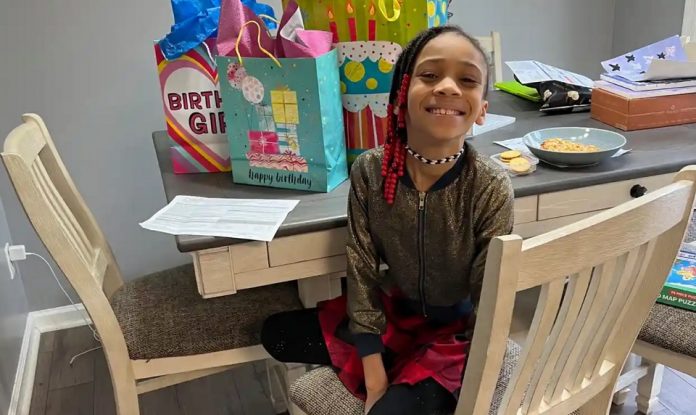Though still rare, the numbers of kids across the US reporting symptoms long after infection are increasing, doctors say
Javanese Hailey found her daughter hunched over in pain inside their home in Manassas, Virginia, about 32 miles south-west of Washington DC.
The nine-year-old could barely walk because her stomach hurt so much, Hailey said, recalling that Sunday evening in October.
So, she asked her basketball- and gymnastics-loving fourth-grader the question that had become routine in recent weeks: on a scale of zero to 10, how bad is the pain?
It’s above 10, her daughter, Haley Bryson, told her.
For about two months, Haley had experienced some combination of headache, fatigue, stomachache, sore throat, earache or breathlessness – reporting pain levels normally around six or seven. She would collapse into bed when she got home from school and ended up losing 17lb from her already small frame, her mother said.
“There did not seem to be a pattern to her symptoms,” said Hailey, a middle and high school math teacher. “Some days were worse than others. Some days she couldn’t even get out of the bed because her stomach hurt so much.”
She added: “It was the scariest thing I ever experienced in my life.”
The symptoms began soon after Haley and her mother contracted Covid-19 in early August. They both had a relatively mild reaction and recovered. But days later, Haley became sick again.
In October, after more than half a dozen trips to her pediatrician, urgent care and the emergency room, she was referred to Children’s National hospital in Washington DC, diagnosed with long Covid and treated in its Pediatric Post-Covid Program, which treats all ages up to 21.
Though long covid diagnosis is considered very rare in children, Haley is not alone. Some children across the US have reported an array of symptoms – ranging from headaches, stomachaches and dizziness, to fatigue, brain fog and mood changes – long after their initial infection.

Haley Bryson pre-Covid. Photograph: Courtesy of Javanese Hailey
Long Covid can last anywhere from four weeks to months – although definitions vary – and, while it presents differently based on developmental stage, doctors say it can affect virtually any age, even infants.
Of the more than 848,000 people who have died in the US from Covid during the pandemic, 727 have been under age 18, according to the CDC. Less than 1.5% of child Covid cases have resulted in hospitalization, according to the American Academy of Pediatrics (AAP).
However, vaccine availability and uptake for children has consistently lagged behind adults in the US. It wasn’t until May that the CDC recommended the Pfizer-BioNTech coronavirus vaccine for children ages 12 to 15, and then not until November that it recommended it for those ages five to 11. Children under the age of five are still not eligible.
Only 20% of five- to 11-year-olds have been fully vaccinated, and 55% of 12-to-17-year-olds, while all adult age groups are at least 60%, according to the CDC.
Plenty of questions surround pediatric long Covid, including exactly how common it is. One Danish study published in the European Journal of Pediatrics in December surveyed about 37,500 children. It found less than 1% of Covid-positive children reported symptoms lasting more than four weeks, compared with a control group. A report from April out of Italy that surveyed 129 children who tested positive for Covid found that about 43% experienced at least one symptom more than 60 days after their initial infection.
In recent months, doctors at some pediatric Covid centers have reported an increase in referrals and patient load. Some have set about expanding clinics or restructuring schedules, while others have found themselves working their way through long waitlists.
The reason for the increase is probably twofold, explained Laura Malone, a physician at the Kennedy Krieger Institute’s Pediatric Post-Covid-19 Rehabilitation Clinic. There is a lot more understanding and acceptance of the condition, leading more families to seek treatment. At the same time, there has also probably been an uptick in long Covid cases following the Delta-fueled surge, as it can take months before patients with the condition are diagnosed and treated after infection.
“The larger the denominator, the more people you have that do have the infection, the more numbers or higher numbers you’re going to get with those with complications from it, like long Covid,” explained Malone, who said Kennedy Krieger’s clinic has had to expand twice over the last six to eight months due to an increase in cases.
Over the past year, the clinic, which meets three half days a month, has seen 47 patients, with over one-third of those patients coming in September, October and November.
Dr Alexandra Brugler Yonts, director of the Pediatric Post-Covid Program at the Children’s National hospital, said they are booked out until March. She explained that over half of the program’s 60 patients had come in just the last three months, despite opening in May 2021.
“A lot of the thought is, ‘Oh it’s just a cold, you know, we get through that.’ But we don’t yet know why certain folks get long Covid and others do not,” she said. “And so you’re getting infected, you’re taking a gamble, rolling the dice that you might, hopefully won’t be one of the ones that has long-term complications.”
The long Covid clinic at Texas Children’s hospital, which has seen a total of 62 patients, has been at its max of six patients or higher a month since September, according to Dr Kristen Sexson Tejtel, its co-director. It’s now in the process of increasing from half days to full days to double the number of patients it can see.
Dr Sarah Risen, its co-director, said increased awareness of long Covid is probably causing at least part of the swell.
“With this increased awareness and acceptance, it allows providers also to start to diagnose and treat and help support the child and the family earlier,” She said.
Dr Carlos Oliveira, pediatric infectious diseases doctor at Yale Medicine, said the Yale New Haven children’s post-Covid care program received 6-8 long covid referrals per month between August and November.
He said there are only theories about what causes long Covid. One hypothesis is that some of the virus proteins linger in the body and continually leak into the bloodstream, causing an immune system reaction. Another one is that it’s a type of autoimmune process in which antibodies made against the virus attack the host, leading to damage long after the virus is gone.
There have been several studies launched in recent months into long Covid. In an especially large-scale effort, theUS National Institutes of Health announced it was starting nationwide studies. The research will include children.
In the meantime, Dr Frank Bell, pediatric infectious disease physician at Swedish medical center in Seattle and a member of the Washington Chapter of the American Academy of Pediatrics board of trustees, emphasized the importance of vaccination.
“By being careful about your exposures … and by being immunized, and by your supporting kids in their recovery from Covid, we think we’ve got a good way to bring that small risk down to something that’s even less likely to happen and be a worry for an individual child or his or her family,” he said.
Doctors have already begun to prepare for the impact the Omicron surge could have on the numbers of long Covid cases.
“It’s hard for me to say what will happen, but we are preparing for a large wave of kids … because the numbers of adolescents and children who have been infected are so high,” said Oliveira.
“It’s bound to lead to a higher number of long Covid based on the numbers alone.”
For Haley, who recently turned 10, five months after her initial infection, her mother said virtually all of her symptoms have finally gone away. But the fear has not.
Each time her daughter complains of a minor stomachache or headache, Hailey said she gets worried that the condition has returned.
“It just takes me back in a flashback to everything that we went through,” she said.
But Haley said she’s just happy to be feeling better so she can get back to her playdates and gymnastics.
“I can have more playdates and have more fun on playdates. I can do arts and crafts and gymnastics and kind of just be silly and run around the stairs and stuff,” she said.
When asked what her pain level is now, she said with little hesitation: “Zero!”
